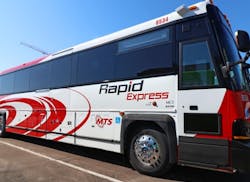Clean Energy Fuels converting dairy waste to 86M gallons of RNG for San Diego MTS Buses
San Diego’s public transportation system plans to use 86 million gallons of renewable natural gas to fuel its bus fleet over the coming years.
The San Diego Metropolitian Transit System (MTS) selected Clean Energy Fuels to supply the RNG which is converting from dairy farm waste. The use of RNG is expected to reduce 73,972 metric tons of carbon dioxide per year, the equivalent of taking 15,939 gasoline cars off the road, planting 1.2 million trees, or recycling 25,596 tons of landfill waste a year, according to the companies.
The RNG utilization deals with the pure methane otherwise released at agricultural sites. Methane emissions are considered multiple times more destructive as a greenhouse gas than CO2, according to many environmental experts.
“San Diego MTS was an early adopter of natural gas in the 1990s and has continued to seek cleaner and more economical fueling options,” said Clean Energy Senior Vice President Chad Lindholm. “As a result of the use of RNG the people who live in the San Diego area will have less exposure to greenhouse gas emissions and cleaner air.”
MTS currently operates a fleet of 764 buses in the San Diego metropolitan area, including 595 that run on RNG and fuel up at four private transit stations.
“RNG is a great example of how we can use innovation and technology to create a cleaner and more sustainable environment,” said MTS Chief Executive Officer Sharon Cooney. “The use of RNG is an important strategy for MTS while we work toward achieving our goal of zero emissions. This contract with Clean Energy will play key role as MTS continues transitioning to a more eco-friendly transit system.”
Check out our On-Demand Webinar about Renewable Natural Gas to supply Microgrids for Data Centers
"Balancing Reliability, Sustainability and Cost: The Role of RNG in Energy Resiliency"
Featuring Enchanted Solutions, Electric Power Research Institute and EnergyTech
Clean Energy continues to invest in the production of RNG and has teamed up with energy firms BP and TotalEnergies to sign partnerships with dairy owners around the country. The company says that its joint venture with TotalEnergies—the Del Rio Dairy project in Texas—is nearing completion. Manure is being introduced to the digester and the first gas injection is expected in the first quarter this year. Once operational, it is expected to generate more than a million gallons of RNG annually.
Construction at South Fork Dairy in Hart County, Texas is expected to begin soon, and it is anticipated that the project will produce 2.6 million gallons of RNG annually once completed.
Additionally, construction on the first dairy projects through the joint venture with BP in Iowa, South Dakota and Minnesota are nearing completion, and RNG is expected to begin flowing in the first quarter of 2023. A total of five projects are expected to come online by mid-year.
Related Story
Clean Energy Fuels opens new RNG Station in Romeoville, Illinois to fuel Amazon fleet
Subscribe to our free, tri-weekly newsletter for regular Insights into the C&I Energy Transition
Clean Energy has signed agreements with several new and existing customers to provide compressed natural gas (CNG) and RNG to power their fleets. Full-service energy logistics provider Filamar Energy Services has inked a deal for an anticipated 4.2 million gallons of CNG to power a fleet of 50 heavy-duty trucks, which will be supported by a new station in Hennessey, Oklahoma to be built by Clean Energy.
Denver International Airport has engaged Clean Energy to upgrade five fueling facilities that will power 95 natural gas vehicles with an anticipated 5 million gallons of RNG. The new stations are expected to be completed later in 2023.
Additionally, Clean Energy will continue to serve Washington Metropolitan Area Transit Authority (WMTA) by extending an operations and maintenance deal for WMTA’s stations in Washington, DC and Arlington, Virginia which fuel 300 buses with about 4.6 million gallons of natural gas.
The company is also extending its partnership with the City of Burbank for an additional 10 years, supplying an estimated 5 million gallons of RNG at two stations to fuel 50 trucks and transit vehicles. Other agreements include US Foods, Pacific Expressway, Propark, Stark Area Regional Transit Authority and Jacksonville Transit.
About the Author
EnergyTech Staff
Rod Walton is head of content for EnergyTech.com. He has spent 17 years covering the energy industry as a newspaper and trade journalist.
Walton formerly was energy writer and business editor at the Tulsa World. Later, he spent six years covering the electricity power sector for Pennwell and Clarion Events. He joined Endeavor and EnergyTech in November 2021.
He can be reached at [email protected].
EnergyTech is focused on the mission critical and large-scale energy users and their sustainability and resiliency goals. These include the commercial and industrial sectors, as well as the military, universities, data centers and microgrids.
Many large-scale energy users such as Fortune 500 companies, and mission-critical users such as military bases, universities, healthcare facilities, public safety and data centers, shifting their energy priorities to reach net-zero carbon goals within the coming decades. These include plans for renewable energy power purchase agreements, but also on-site resiliency projects such as microgrids, combined heat and power, rooftop solar, energy storage, digitalization and building efficiency upgrades.
